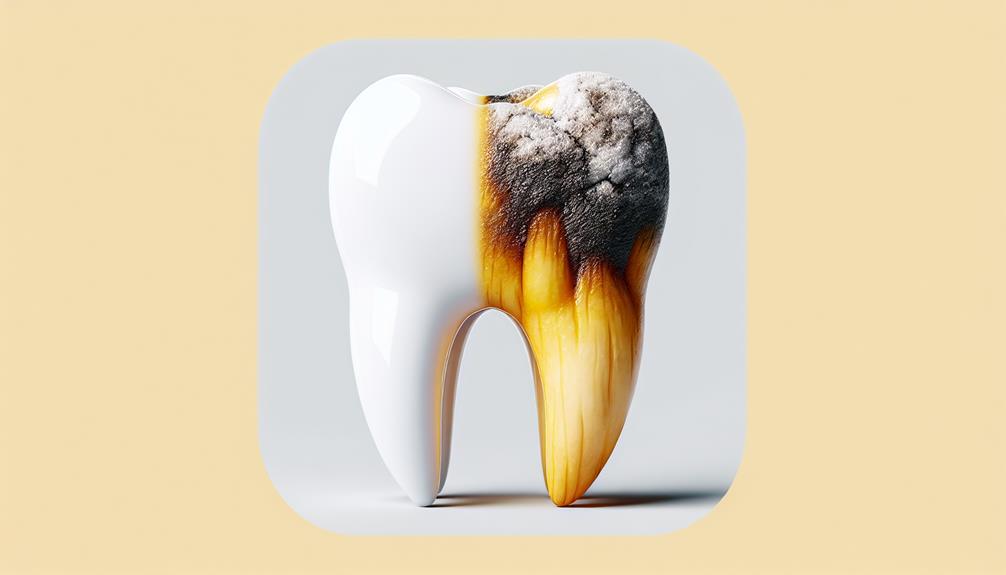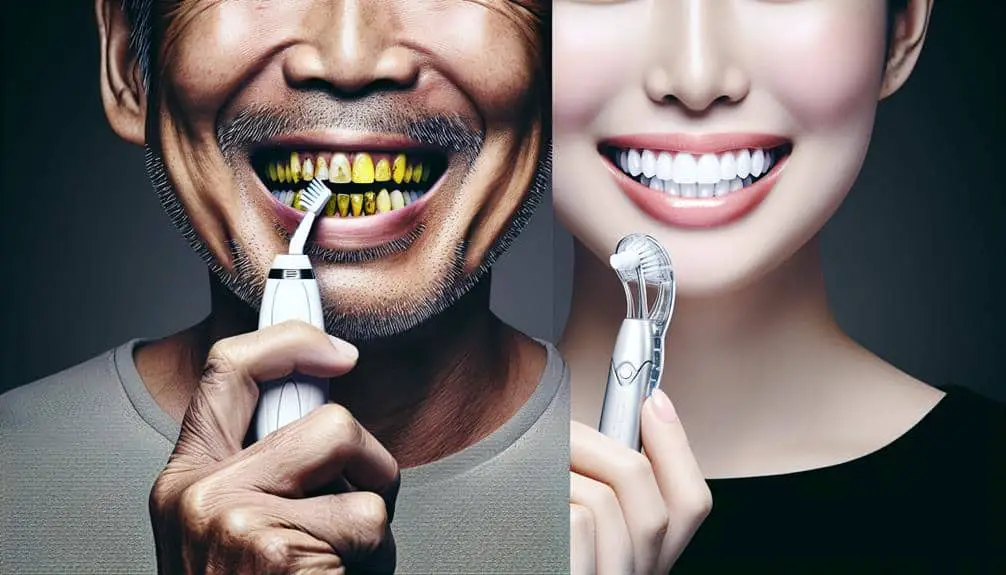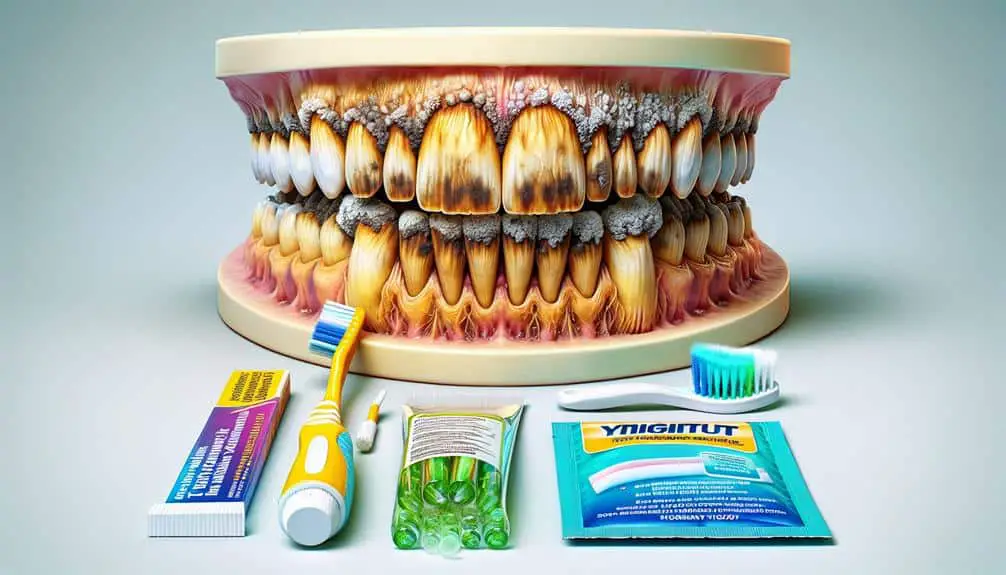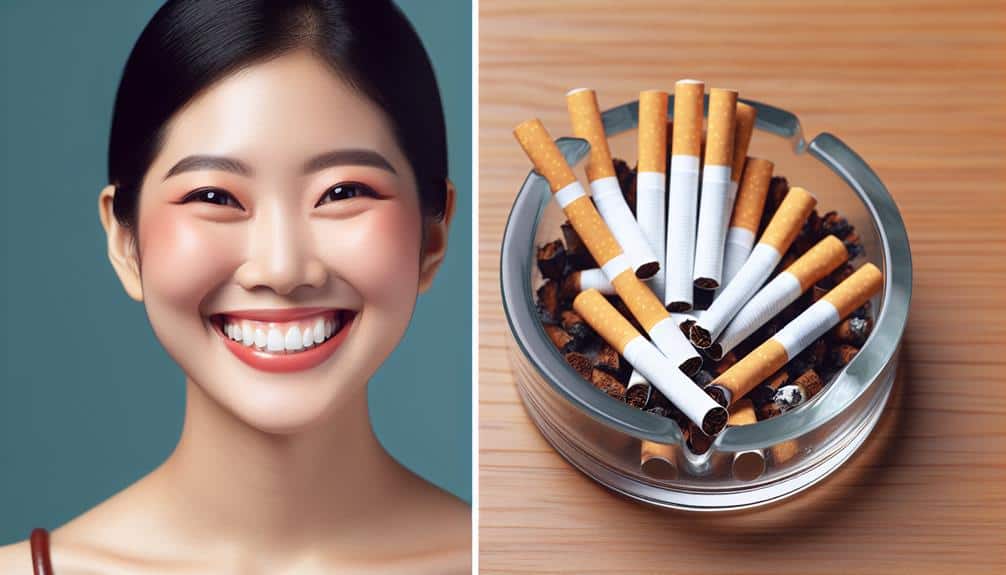If you smoke, your teeth whitening efforts may face challenges. Smoking weakens your tooth enamel, making it easier for stains to set in. The tar and nicotine in tobacco products cause yellow or brown discoloration that can be challenging to remove. Additionally, smoking interferes with the effectiveness of whitening treatments, often requiring alternative methods. Remember, there are tips and solutions available to help you achieve a brighter smile despite these obstacles.
Key Points
- Smoking causes deep-seated nicotine stains resistant to traditional whitening methods.
- Nicotine interference reduces the effectiveness of bleaching agents on teeth.
- Tar and nicotine stains penetrate enamel, requiring alternative whitening options.
- Consistent oral hygiene is crucial due to smoking's impact on whitening results.
- Lifestyle changes, like quitting smoking, are essential to prevent staining and maintain whiter teeth.
Impact of Smoking on Tooth Enamel
Smoking significantly weakens tooth enamel, leading to increased susceptibility to staining and discoloration. Enamel erosion is a common outcome of smoking, resulting in thinner enamel that exposes the underlying dentin, making teeth more prone to sensitivity and damage. The substances in tobacco products can contribute to discoloration, causing teeth to take on a yellowish hue over time. This yellowing effect is a direct result of the tar and nicotine present in cigarettes, which have a strong affinity for tooth enamel, leading to unsightly stains that are difficult to remove.
Additionally, the heat from smoking can also impact the teeth by drying out the mouth and reducing saliva flow, which plays a vital role in protecting tooth enamel. This decreased saliva production can worsen enamel erosion and contribute to further discoloration. It's important to be aware of the harmful effects smoking can have on tooth enamel, leading to increased tooth sensitivity, enamel erosion, and yellowing of the teeth.
Staining Effects of Smoking
The discoloration caused by smoking can be attributed to the tar and nicotine in tobacco products, leaving lasting stains on your teeth that are difficult to remove. Nicotine stains, also known as tobacco discoloration, are notorious for adhering to the enamel surface and causing yellow or brown discoloration. These stains aren't merely surface-level; they penetrate the enamel, making them particularly stubborn to eliminate.
The porous nature of tooth enamel allows these nicotine stains to seep into the structure of the teeth, making them resistant to regular brushing and over-the-counter whitening products. As a result, smokers often struggle to achieve the desired level of whiteness through conventional means. Professional teeth whitening treatments may be necessary to effectively address these deep-seated stains caused by smoking.
To combat the staining effects of smoking, it's essential to prioritize oral hygiene practices and seek guidance from dental professionals. Regular dental cleanings, proper brushing techniques, and professional whitening treatments tailored to address nicotine stains can help smokers restore the natural whiteness of their teeth and improve their overall oral health.
Challenges With Dental Bleaching for Smokers
Challenges may arise when attempting dental bleaching for individuals who smoke due to the deep-seated nicotine stains that prove resistant to traditional whitening methods. Nicotine interference can greatly impact the effectiveness of dental bleaching, leading to persistent yellowing and discoloration.
Smokers often face difficulties in achieving desired teeth whitening results due to the nature of nicotine stains. These stains tend to penetrate deep into the enamel, making them harder to remove compared to surface stains caused by other factors. As a result, traditional bleaching methods may not be as effective in addressing the discoloration caused by smoking.
The presence of nicotine in the teeth can interfere with the bleaching agents, hindering their ability to break down the stains effectively. This interference can lead to inconsistencies in the whitening process, with certain areas showing little to no improvement in color. Smokers looking to undergo dental bleaching should be aware of these challenges and may need to explore alternative whitening options or consult with their dentist for specialized treatments tailored to address nicotine-related discoloration.
Long-Term Consequences for Teeth Whitening
Long-term maintenance of teeth whitening results requires consistent adherence to oral hygiene practices and lifestyle modifications. Despite successful initial whitening treatments, there are limitations to how long the effects can last, especially for individuals who smoke. Smoking poses significant risks to the long-term results of teeth whitening. Nicotine and tar from cigarettes can gradually stain teeth, counteracting the whitening effects. Additionally, smoking increases the risk of gum disease and oral cancer, which can impact the overall appearance of your smile and the longevity of teeth whitening results.
To maintain the benefits of teeth whitening over time, it's essential to quit smoking or reduce tobacco use. Implementing a thorough oral hygiene routine, including regular brushing, flossing, and dental check-ups, can help preserve the whiteness of your teeth. Avoiding foods and beverages that stain teeth, such as coffee, tea, and red wine, can also contribute to maintaining a brighter smile. By being mindful of these factors, you can prolong the results of teeth whitening and promote better oral health.
Tips for Smokers Seeking Whiter Teeth
For smokers looking to enhance the whiteness of their teeth, implementing specific oral care practices can help achieve a brighter smile despite the obstacles posed by smoking. When seeking whiter teeth as a smoker, consider using nicotine patches or exploring alternative forms of nicotine intake to reduce the direct contact of tobacco with your teeth. Additionally, quitting smoking altogether not only benefits your overall health but also plays a crucial role in improving the appearance of your teeth. Tobacco cessation allows your teeth to naturally start recovering from the staining effects of smoking, leading to a brighter smile over time.
Incorporating regular brushing with a whitening toothpaste, flossing daily, and using mouthwash can help remove surface stains and prevent further discoloration caused by smoking. Visiting your dentist for professional cleanings and whitening treatments can also help in achieving a whiter smile. Remember, consistency in oral hygiene practices and seeking support for tobacco cessation are key steps for smokers on the journey to whiter teeth despite the challenges posed by smoking.
Frequently Asked Questions
Can Smoking Affect the Effectiveness of At-Home Teeth Whitening Products?
Smoking habits can impact the effectiveness of at-home teeth whitening products. Nicotine and tar in cigarettes can stain teeth, making whitening techniques less successful. Consistent smoking may require more frequent or intensive whitening treatments for desired results.
Are There Any Natural Remedies That Smokers Can Use to Whiten Their Teeth?
For smokers seeking natural remedies to whiten teeth, consider herbal remedies like baking soda or DIY techniques such as activated charcoal powder. These alternatives can be effective alongside traditional whitening strips for a brighter smile.
How Often Should Smokers Have Professional Teeth Whitening Treatments to Maintain Results?
To maintain teeth whitening results as a smoker, schedule professional treatments based on your dentist's recommendations. Follow a consistent maintenance routine at home, including proper oral hygiene and avoiding smoking to preserve the effects.
Does Smoking Increase the Risk of Developing Oral Health Issues Other Than Stained Teeth?
Maintaining good oral hygiene is essential, particularly for smokers. Tobacco use increases the risk of various oral health issues beyond stained teeth, such as gum disease and oral cancer. Regular dental check-ups are vital for early detection and prevention.
Can Quitting Smoking Help Improve the Results of Teeth Whitening Treatments?
Quitting smoking is key for enhancing teeth whitening results. Lifestyle changes like this positively impact dental care outcomes. Your commitment to better oral health through quitting smoking can greatly boost the effectiveness of whitening treatments.
Conclusion
To sum up, smoking has a detrimental impact on teeth whitening efforts. The nicotine and tar in cigarettes can damage tooth enamel, leading to stubborn stains that are difficult to remove. Dental bleaching may not be as effective for smokers, and long-term consequences can include yellowing and discoloration.
For smokers seeking whiter teeth, it's crucial to contemplate quitting smoking and consulting with a dentist for alternative whitening options. Remember, a brighter smile starts with healthier habits.



